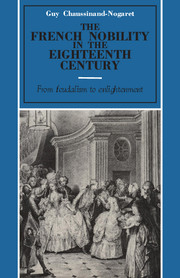Book contents
- Frontmatter
- Contents
- Introduction: the gilded ghetto of royal nobility
- 1 The Enlightenment and noble ideology
- 2 The nobility between myth and history
- 3 Plutocrats and paupers
- 4 The fundamental divide: culture
- 5 The nobility and capitalism
- 6 Rites and strategies: the marriage market
- 7 The nobility against the Old Regime
- 8 A plan for society
- Conclusion
- Afterword to the English edition
- Notes
- Bibliography
- Supplementary bibliography
- Index
7 - The nobility against the Old Regime
Published online by Cambridge University Press: 05 June 2012
- Frontmatter
- Contents
- Introduction: the gilded ghetto of royal nobility
- 1 The Enlightenment and noble ideology
- 2 The nobility between myth and history
- 3 Plutocrats and paupers
- 4 The fundamental divide: culture
- 5 The nobility and capitalism
- 6 Rites and strategies: the marriage market
- 7 The nobility against the Old Regime
- 8 A plan for society
- Conclusion
- Afterword to the English edition
- Notes
- Bibliography
- Supplementary bibliography
- Index
Summary
The cahiers de doléances – grievance lists which constitute the last will and testament of the old France – are the widest, most detailed and truest test of opinion ever made in ancien régime France, and we might add that we have no comparable survey for any other period in the country's history.
This picture of the French outlook is exemplary in more ways than one. It covers the whole country, from the remotest villages in the cold lands of the Auvergne and the Pyrenees, down to the fertile plains and urbanised regions. More important still, it gives us the opinion of different groups in the population; not a dubious amalgam in which undifferentiated social levels are mixed up and lose all identity, but a separate picture for each functional group under the traditional division of society into orders. Although at the level which concerns us here, that of the bailliages, this system has the disadvantage for the third estate of overestimating the weight of educated town dwellers as opposed to the rural population, for my purpose its advantage is clear: the nobility alone drew up their own cahiers. So their picture is neither warped nor filtered. It certainly did happen that the third estate and the nobility were sufficiently aware of the closeness and similarity of their demands to draw up their cahiers in common. In practice, this coming together would have happened more frequently if the third and the nobility had been the only ones involved.
- Type
- Chapter
- Information
- The French Nobility in the Eighteenth CenturyFrom Feudalism to Enlightenment, pp. 130 - 144Publisher: Cambridge University PressPrint publication year: 1985



